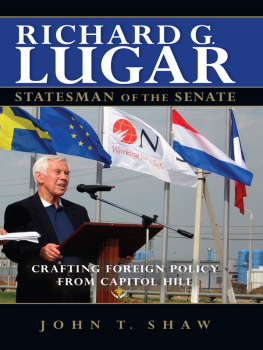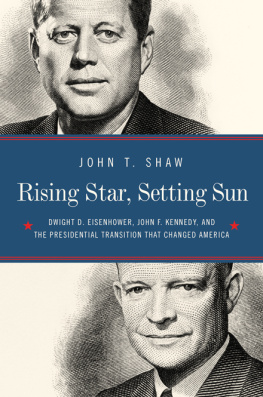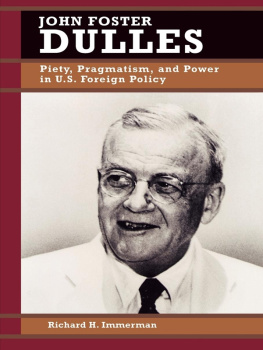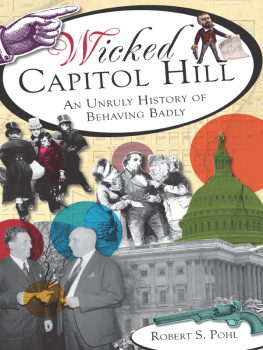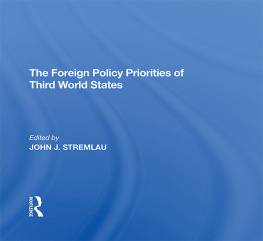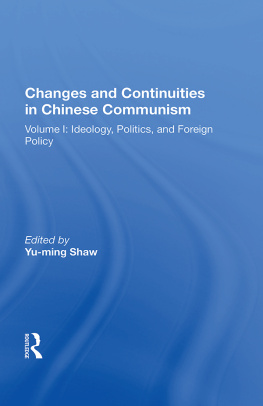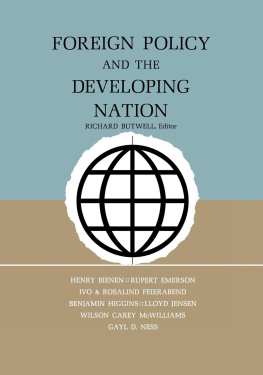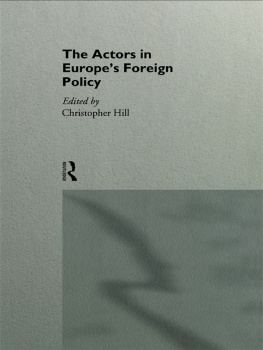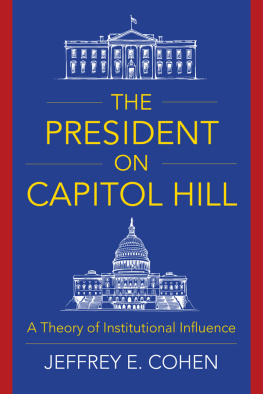This book is a publication of
Indiana University Press
601 North Morton Street
Bloomington, Indiana 47404-3797 USA
iupress.indiana.edu
Telephone orders 800-842-6796
Fax orders 812-855-7931
2012 by John T. Shaw
All rights reserved
No part of this book may be reproduced or utilized in any form or by any means, electronic or mechanical, including photocopying and recording, or by any information storage and retrieval system, without permission in writing from the publisher. The Association of American University Presses Resolution on Permissions constitutes the only exception to this prohibition.

The paper used in this publication meets the minimum requirements of the American National Standard for Information SciencesPermanence of Paper for Printed Library Materials, ANSI Z39.48-1992.
Manufactured in the United States of America
Cataloging information is available from the Library of Congress.
1 2 3 4 5 17 16 15 14 13 12
PREFACE
Richard G. Lugar has been one of the most influential U.S. senators in the realm of foreign policy for more than a quarter of a century. While he has not always attracted as much attention as some of his Senate colleagues, Lugars accomplishments place him in the upper echelon of his contemporaries. He will, I believe, be remembered in the top tier of Senate foreign policy heavyweights, in the company of such historically significant senators as Arthur Vandenberg, Henry Jackson, and J. William Fulbright. Assessing his current work and long-term legacy requires that an analyst confront important and difficult questions: Can a politician also be a statesman? What is the relationship between statesmanship and effectiveness in Congress? Is statesmanship still an effective operating strategy in this charged and polarized political environment? What are the costs and benefits for a lawmaker in adopting the role of a statesman?
Ive covered Capitol Hill for more than 20 years as a congressional reporter and have had the opportunity to observe many senators closely, including Robert Dole, George Mitchell, Daniel Patrick Moynihan, John Danforth, Edward Kennedy, Al Gore, Mark Hatfield, John Chafee, Lloyd Bentsen, Bill Bradley, John Warner, and Sam Nunn. Lugar has long intrigued me as a throwback to an earlier era when many senators developed expertise in particular areas and embraced the rewards and responsibilities of national leadership. They were effective politicians who were also able and willing to take the long view. Now, in an increasingly polarized, hyper-partisan Washington, senators who place their primary emphasis on advancing the national good are rare. A lifelong and loyal Republican, Lugar is usually willing to put his party label aside and work with members of both parties to tackle the nations most serious problems. His most significant collaborations have been with Democrats such as Sam Nunn, Joe Biden, and Barack Obama.
When Time magazine ran profiles of the ten most effective senators several years ago, Lugar was included and called simply The Wise Man. The article described him as principled, tough, cool-headed, and ahead of the curve on many policy matters. He is a quiet, intelligent, steady force, former senator Bob Kerrey, a long-time Lugar colleague, told Time. Hes unmovable when he reaches a conclusion about what ought to be done.
During his tenure in the Senate, Lugar has achieved some important successes, including creation of the landmark Nunn-Lugar Cooperative Threat Reduction Program that has made the United States and the world more secure. He has pushed for the United States to be a powerful actor on the world stage, part of a community of nations that respects the rule of law and international norms. There have also been setbacks. Lugar chaired the Foreign Relations Committee when the Iraq war was launched in 2003 and continued to head up the panel during the critical years of the war. Some, including several of Lugars strongest supporters, believe that the senator should have been far more forceful in outlining his concerns about the war. They believe that Lugar, almost uniquely, had the stature to challenge the Bush administration to reassess its plans for the war in Iraq. Instead, he opted for expressing reservations in private meetingsreservations that were largely brushed aside. Though he was well informed and even prescient about the wars risks, he had only a modest impact on the administrations Iraq policy. One question that we will consider is whether a more combative style, such as that used by Senate Foreign Relations Committee Chairman J. William Fulbright during the Vietnam War, would have been more effective. Students of the current Senate question whether Lugars careful, methodical approach to developing policy can still persuade fellow lawmakers in a political environment that is so polarized and combative.
There are some paradoxes, or at least interesting complexities, surrounding Lugar. He is a conservative Republican who breaks from prevailing party views in such areas as environmental protection, conservation, federal nutrition programs, international law, global institutions such as the United Nations, aggressive HIV/AIDS programs, robust diplomacy, and generous foreign aid. Though modest and self-deprecating, he has a lawmakers penchant for naming things after himself, or at least allowing others to do so. His national security program is known as the Lugar Doctrine, his ideas on energy, the Lugar Energy Initiative. He has named scores of awards and internships after himself. There is even the Richard G. Lugar School Food Service Employee of the Year award, given by Indianas Department of Education to the school food service employee who demonstrates the most outstanding professionalism.
Though Lugar remains involved in Congresss legislative struggles, he also has a broader conception of the role of the senator as a kind of statesman who undertakes long-term projects for the national good, even if they have few short-term benefits. In this capacity, Lugar builds networks outside of government, delivers detailed policy speeches, meets with key international leaders, and travels extensivelyand without apology. His schedule looks more like that of a deputy foreign minister than a senator. He probably knows more about the internal politics of Russia, Ukraine, and Albania than anyone else in Congress. Lugar has a clear view of how Congress can shape foreign policy. The president, he argues, is the natural leader on foreign policy. But he is convinced that Congress can, and should, play a constructive role in shaping the agenda and solving problems. Lugar has shown how to do so for more than three decades. Consequently, the best way to measure Lugars success is not just in the number of bills he has written and passed but also the ways in which he influences debates about American foreign policy.
Lugars success as a senator rests on several characteristics of his working style, including the fact that he has developed a formidable political operation at home that gives him considerable running room on Capitol Hill. Being an icon in Indiana has allowed him to be a player in Washington.
 The paper used in this publication meets the minimum requirements of the American National Standard for Information SciencesPermanence of Paper for Printed Library Materials, ANSI Z39.48-1992.
The paper used in this publication meets the minimum requirements of the American National Standard for Information SciencesPermanence of Paper for Printed Library Materials, ANSI Z39.48-1992.

